QuestionQUESTION: I found a newborn in my yard 7 days ago. I have researched how to care for him and he appears to be doing well, except that he has developed some issues w/infection. 2 days ago I noticed his toes on his foot were inflamed and had a pus pocket. He also had a cyst like bump on his head and some smaller ones on other areas of the body. I took him to the vet and he cleaned the area on the foot and advised me in its care. He wasn't concerned about the bumps on the head unless they filled with fluid at a later time. He said at 5 days old he was too young for oral antibiotics. Yesterday while cleaning his foot and giving him a bath, I noticed his umbilical cord has pus. He also developed a bump on his chin that was filled with pus. I have cleaned all of those areas and continue to apply the topical antibiotic. The cyst on his head does have a small amount of fluid today. I have a call in to the vet today to see if I should come back in. I am awaiting a call back. Should I urge him to give the baby an antibiotic? I have tried so hard to save his little life and will be crushed if something happens to him. Right now he is constipated since changing to a powdered form of KMR. He did have more of a loose, mucousy stool while on the pre mixed liquid KMR. What advice can you give me? Thank you
ANSWER: Hi Francie. I imagine you have heard back from the vet already today. If they did not put up an antibiotic for you, I would urge you to push for one. Vets are always a little apprehensive to give oral antibiotics to kittens this young for a few reasons. One, they can be difficult to work out a dosage. Two, they can be difficult to administer, as the babies can aspirate them. Three, they can cause digestive upset, which in itself could kill a kitten. And no vet wants to be responsible for any of these things. However, my position is, the kitten is obviously in a very bad situation. It appears he has something systemic for there to be abscesses or something similar popping up all over his body. It does not sound like treating it with a topical antibiotic is going to be enough, and without treating the underlying cause, the possibility that you'll lose him is, unfortunately, very real. If you're going to lose him, how big of a risk can antibiotics really pose?
I am frank with my vets when I know I have a cat that is very likely facing a deadly situation. I tell them I know that I'm losing him, and as a last effort, despite knowing the risks, I want to try such-and-such a treatment. I allow the vets to give me the warnings, I acknowledge them, think it through, and if it still makes sense, I choose to go ahead with the treatment. I have never had a vet refuse to dispense a treatment as long as I have known that the end result may not be what I had hoped for. Antibiotics have saved some of my newborns. Sadly, some newborns are beyond saving. But I believe I had lost a lot more in my inexperienced days by standing by and allowing my kittens to go without treatment because a couple of vets told me the kittens were just too young to treat.
As for the constipation, if he is going two days or more between bowel movements, talk to the vet about whether he should receive any kind of lubricant laxative or a mild enema. Also, slightly increasing the concentration of the formula (adding a little more powder) might help. This increases the concentration of the fat per meal, which may help move things along. Feeding more often also tends to help.
Good luck, I hope he pulls through!
Jessica
---------- FOLLOW-UP ----------
QUESTION: Thank you Jessica for your help. He did give me an antibiotic and although it was touch and go on Friday, he has pulled through. I'm confused about the constipation, though. We have given him mineral oil and I continue to try to give it to him. He has finally gone 2 x now since Friday, but last night cried all night seemingly in pain. Once he had a BM, he seemed to feel better. The vet told me to decrease the concentration of the powder-and you say as well as other websites to increase it. So increasing the fat is the answer, not increasing the water? Also, how do I know if he is taking the antibiotic and mineral oil laxative properly to avoid aspiration. I ask be/c since giving him the mineral oil last night, he has periods of making funny noises almost like sneezes, but w/o an actual sneeze? Have I done something wrong? I'm exasperated, sleep deprived and feeling frustrated over being confined to a room in my house...and totally in love with him at the same time. Thank you so much.
AnswerSome vets like to add extra water or Pedialyte to the formula when kittens are constipated, but I have not found this to be terribly helpful, and it seems to just fill them up with water without providing them with nourishment. Giving them more concentrated formula usually works better with my kittens. Although kittens don't normally drink water at this age, since he's suffering constipation, you can give him a cc or so of plain water between meals to encourage hydration. However, there are times when, despite all we do with diet, a laxative is needed.
I suspect the vet has directed you to use the mineral oil? Sometimes it might be the only answer, but it makes me nervous. Because mineral oil is odorless and flavorless and it has such a light texture, kittens can actually fail to realize it's present in their mouths and breathe it in instead of swallowing it. And because it's an oil, it will coat the lungs and cause quick and severe breathing problems. I fear this could be what's occurring when the kitten is making sneezing noises after you have administered the mineral oil. My vets usually recommend using a product called Laxatone, which is a gel laxative for cats. This is essentially flavored petroleum jelly. It also does contain some mineral oil, but because it's flavored and the gel is of a thicker consistency, it is less likely to be aspirated than plain mineral oil. It may be too thick to feed as is to the kitten and may need to be mixed with a little formula. Certainly, ask your vet whether you should make the switch and how much should be given to the kitten. If you'd rather stay with the mineral oil, I would at least try mixing this with a little formula so that it's flavored, and he knows he's supposed to be swallowing something.
I know you must be ready to pull your hair out. It is a big undertaking to hand raise an orphaned kitten! In a few short weeks, you'll be wondering where the time went and may even wish that he needed you to wake up for a midnight feeding once in a while! Keep up the good work!

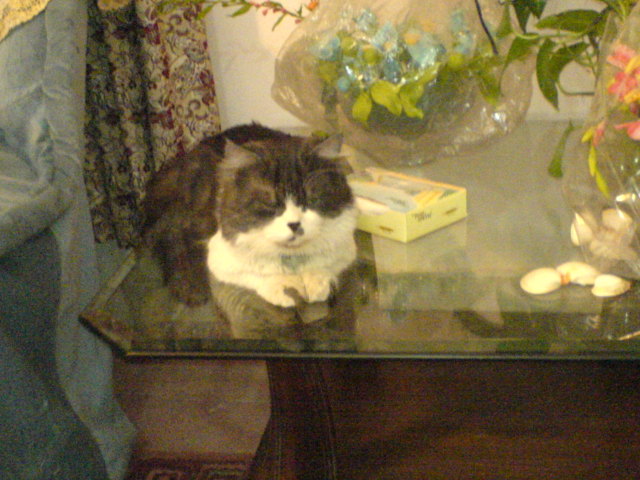 Persian Male Behavioral Issues.
Question
Jimmy
Dear Karen
Hope you are fine. I
Persian Male Behavioral Issues.
Question
Jimmy
Dear Karen
Hope you are fine. I
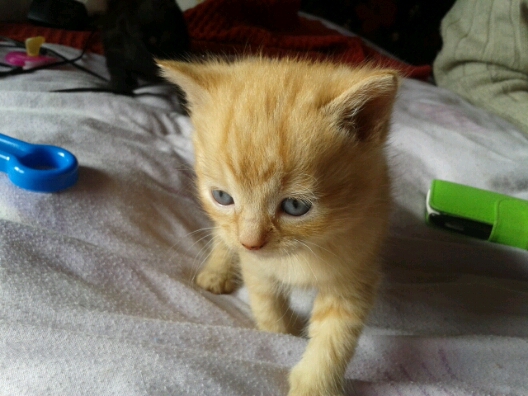 Two Kittens from different litters?
Question
Ginger Female
We wanted to get 2 kitten
Two Kittens from different litters?
Question
Ginger Female
We wanted to get 2 kitten
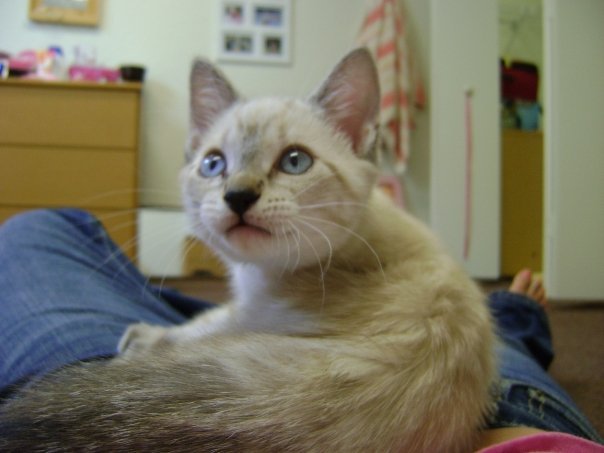 What kind of cat do i have?
Question
Chula
Ive been trying to figure out wha
What kind of cat do i have?
Question
Chula
Ive been trying to figure out wha
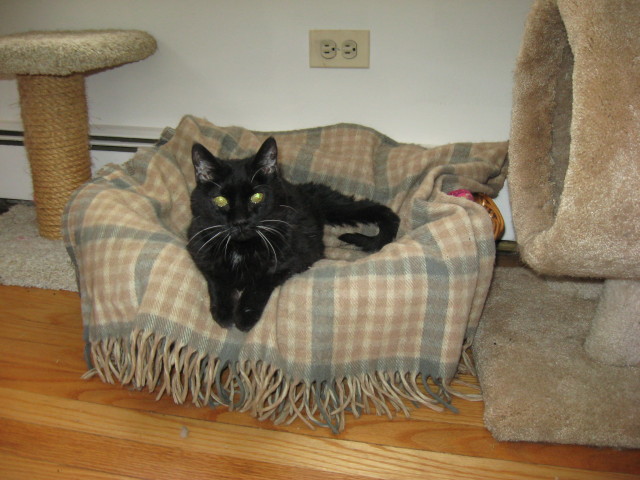 Senile Cat?
Question
Chloe
I have a cat thats about 18 1/2 years ol
Senile Cat?
Question
Chloe
I have a cat thats about 18 1/2 years ol
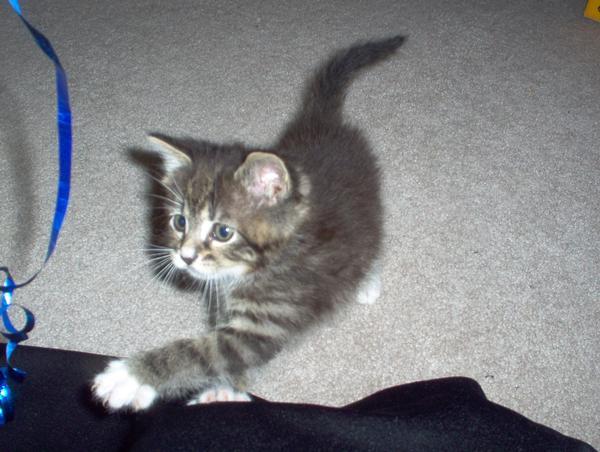 runts
Question
stubby(my cat)
Can the mother chew off
runts
Question
stubby(my cat)
Can the mother chew off